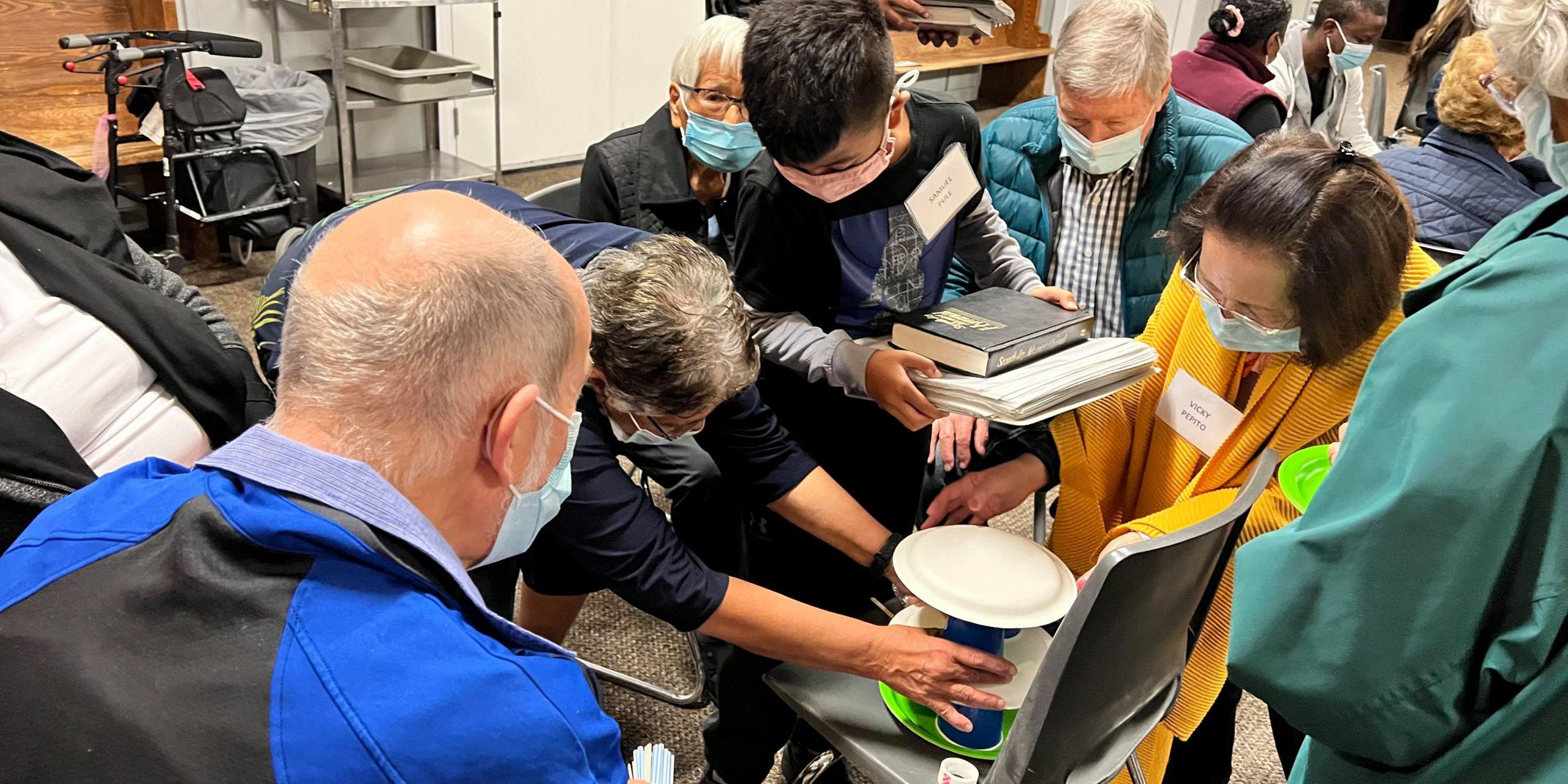Posted: October 8th, 2021
Lessons on Connecting Like Jesus from Heritage Green Church Retreat
cagboka@adventistontario.org

This past weekend (Fri., Oct. 1 to Sun., Oct. 3), I joined roughly 90 people for the Heritage Green Church’s family retreat at Camp Frenda. Most participants were Heritage Green members, but visitors came from Immanuel, Bronte, Guelph, Richmond Hill and Willowdale Churches. It was a blessing to fellowship in person, outside the church setting, and experience God against the backdrop of beautiful Lake Rosseau.
The retreat’s theme was “Reimagine: God, Growth and Goals.” Starting Friday night, Pastors Elizabeth and Orlando Pule (Family Ministries co-directors) and John Scott (Youth director) challenged us to reimagine who we are as God’s servants and be intentional about connecting like Jesus. We also enjoyed uplifting music, including a youth orchestra and praise team leading out in the theme song, “How Great is Our God,” and other favourites, a father-son violin duo and young ladies’ and men’s vocal ensembles.
Among the weekend’s many takeaways were:
- God can use all parts of the body. In her Friday message titled “The Forgotten Parts,” Pastor Elizabeth Pule had small groups construct a foundation strong enough to hold a pile of books using various materials—i.e., cups, plates, straws, tape. She then noted that not all materials were used. Similarly, the body of Christ has forgotten parts; yet everyone has a purpose in God’s kingdom. The retreat honoured all parts, with prayers of consecration for children, youth and seniors.
- Youth have many talents to share. Youth were featured all weekend, particularly as musicians, which was a highlight for many. “Something that I loved was seeing so many young people here and so many of them playing instruments praising God,” said attendee Adriana Alvarez. Heritage Green Church pastor, Edwin Emerson, mentioned encouraging a singing group of young boys to keep using their talents for the Lord. “These things they may carry for a long time.”
- Branding is essential for ministry success. Pastor Orlando Pule gave a lesson on branding in his Sabbath message titled “Legacy.” That morning, participants captured what they wanted their community to know about their church in words or pictures on Bristol board. Common terms were “inclusive, compassionate and helpful.” They learned that for individuals and churches, our brand (e.g., our identity) should guide everything we do.
- We must be the bridge for people to get to Jesus. Orlando Pule also reminded us that our most powerful ministry tool is telling God’s story—the gift of salvation. He emphasized that “biblical justice is social justice,” as Christ had a heart for the marginalized and oppressed. He urged us to “seek opportunities to share the hope found in Jesus” by listening to people’s stories and sharing our testimonies. Finally, Liz Pule prayed, we must be “individuals of light and positivity no matter where [we] go so that when people meet [us], they can see Jesus.”
- God has all the resources needed for ministry. A lively Sabbath evening debate underlined that that human limitations do not constrain God; there, everyone could debate whether money, the Word of God or people were most important for evangelism. Unsurprisingly, the Word of God won. According to Pat Stubbard, “You can have all the people, all the money, all the setup, but without God, what are you doing? What are you preaching? The destination is heaven. So if you have an evangelistic idea, pray to the Lord, and He’ll give you the people. He’ll give you the money. He'll give you absolutely everything you need.”
- The gospel is for everyone. All weekend, the speakers underlined that being inclusive means accepting people who don’t think, look or act like us. On Sunday, Pastor John Scott shared the story of Peter and Cornelius. While praying, Cornelius was told by an angel to send men to Peter for a special mission. Shortly before they arrived, Peter had a vision that a white sheet came down from heaven full of unclean foods. When he protested that he couldn’t eat them, God said, “Do not call anything impure that God has made clean” (Acts 10:15, NIV). Peter realized the vision was not about food but about his calling to share God with gentiles. He then went to Cornelius’s home with the men, and Cornelius and his family became the first gentile converts.Pastor Scott’s big takeaway: “We should not judge a book by its cover. Every single individual needs Jesus Christ. The plan of salvation is not only related to Seventh-day Adventists. For God so loved the world … the entire world. He loves Buddhists, Baptists, Hindus, Muslims, Satanists, unbelievers, agnostics. He died for the Cornelius's of the world.”
- Intergenerational connections strengthen the church body. Children and youth outnumbered adults at this retreat, and a third of the youth were visitors invited by their friends, including one non-Adventist. Accordingly, several activities were youth-friendly, such as fireside vespers, a scavenger hunt, skits and canoeing/kayaking. But the program also brought different age groups together, including group activities during the messages, the debate and mealtime. It was heartwarming to see children and youth happily engaging with seniors. Pastor Emerson admitted that these connections were intentional. “We wanted to keep our youth, adults and young people mingling with each other.”
- God is working behind the scenes for His glory. We might not understand why things happen as they do, but God has a master plan for all of our lives. As Pastor Scott stated, “We don't have a 35,000-foot view of the world. We don't get to see the big picture as God sees it. He understands the end from the beginning. And He knows how things will play out and map out. [We just have to] be willing to trust Him.”
- Church can take place outside of the church building. We learned this over the past year, as churches found creative means of reaching international audiences online. Orlando Pule gave the example of his late father, who shared Jesus with his next-door neighbours—gang members—by offering them a meal every Sabbath. In these exchanges, he got to know them and talk to them about God. They wept at his passing and performed the haka (a mourning chant-dance) at his funeral.
He concluded, “We don't have to preach evangelistic series. We don't have to go out and have a microphone out on the corner of the street. We have our neighbours that we go to reach out to share the good news. We don't know how far our influence and impact are going to go. All God says is this. Go and make disciples.”

